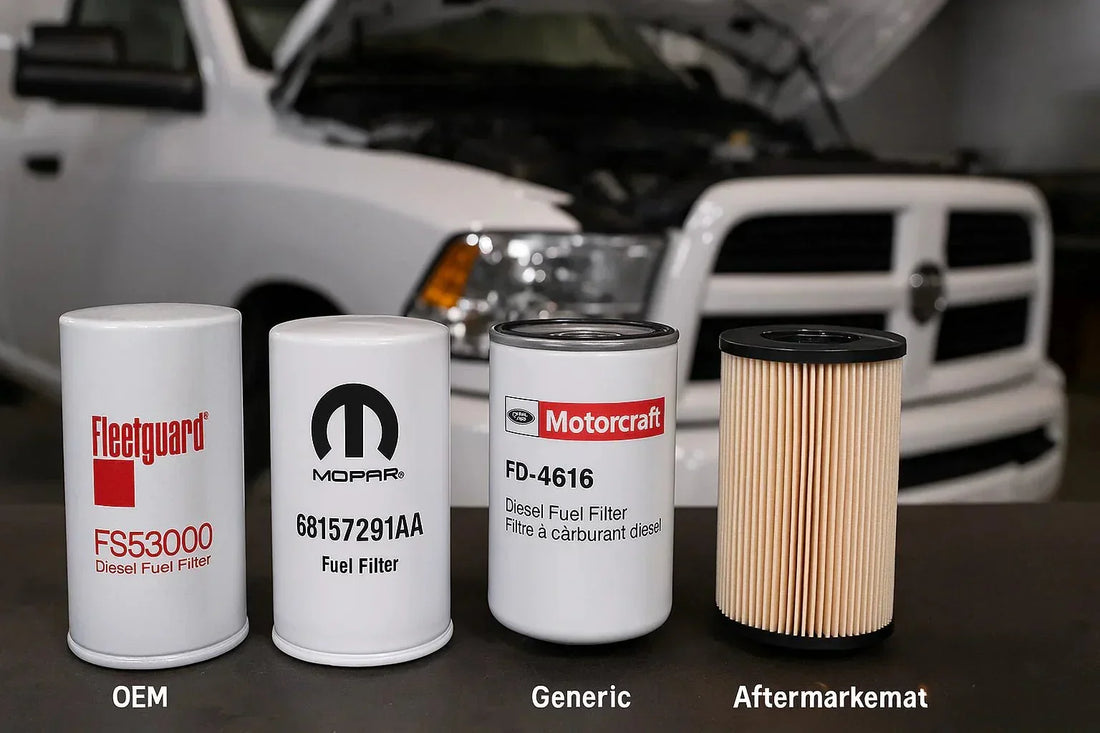
OEM vs Aftermarket Filters: Which Is Better for Diesel Performance?
Share
When it comes to maintaining your diesel engine, few choices matter more than the type of filter you use. Whether you own a Dodge RAM 6.7L Cummins, a Ford F250 Powerstroke, or a commercial vehicle running on a Cummins ISX, choosing between OEM filters and aftermarket alternatives can significantly impact your engine's health, performance, and longevity. This guide explores the critical differences and helps you decide what’s best for your truck.
What Are OEM Filters?
OEM (Original Equipment Manufacturer) filters are designed by the same manufacturer that built your engine. Brands like Fleetguard, Motorcraft, and Mopar supply filters that meet strict factory specifications. For example, Fleetguard LF14000NN, Motorcraft FD-4615, and Mopar 68197867AB are engineered specifically for their respective engines.
These filters offer unmatched fit, filtration efficiency, and durability. OEMs conduct extensive testing—including SAE certification, thermal cycling, and fuel/oil compatibility checks—to ensure long-term reliability under high-pressure and high-temperature conditions.
What Are Aftermarket Filters?
Aftermarket filters are produced by third-party manufacturers not affiliated with the vehicle brand. While some are high-quality, many are cost-driven and may not meet OEM standards. They may claim compatibility but can fall short in areas like micron rating, flow resistance, or gasket quality.
Performance Comparison
-
Filtration Efficiency: OEM filters typically trap 98% or more of contaminants (down to 20 microns or finer), while lower-tier aftermarket filters might allow impurities to pass through, potentially damaging injectors or bearings.
-
Fit & Seal Integrity: OEM parts like the Fleetguard CV52001 or Motorcraft FD-4625 are precision-fit. Many aftermarket filters struggle with thread matching or gasket sealing, leading to leaks.
-
Service Life: Genuine OEM filters often have longer service intervals, meaning fewer replacements over time.
-
Warranty Compliance: Using OEM filters ensures that your truck’s warranty remains valid, especially critical for fleet vehicles.
Cost vs. Long-Term Value
While aftermarket filters might save you a few dollars upfront, poor filtration can cost you thousands in repairs. A clogged fuel injector or a failed turbo due to oil contamination isn't worth the initial savings. OEM filters represent better value over time through reduced maintenance, fewer failures, and optimal fuel efficiency.
Use Cases: When OEM Wins
- High-mileage diesel trucks
- Commercial fleets requiring reliability
- Newer model engines with tight manufacturer tolerances
Use Cases: When Aftermarket Might Suffice
- Older engines not under warranty
- Tight budgets (though with caution)
- Emergency short-term use
Conclusion
If you're serious about diesel performance, longevity, and reliability, OEM filters are the clear winner. Whether it's a Fleetguard oil filter, a Motorcraft diesel fuel filter, or a Mopar filtration kit, sticking with genuine parts ensures your engine runs cleaner, cooler, and longer.
